Abstract
Aqueous suspensions of heat-killed Mycobacterium leprae in a dose of 10(7) organisms were highly immunogenic when injected intradermally (i.d.). The same dose of bacteria did not sensitize when given intraperitoneally (i.p.) or intravenously (i.v.), and did so only minimally at best when given subcutaneously. The i.d. route was the most immunogenic for sheep erythrocytes also. M. leprae injected i.p. or i.v. stimulated immune tolerance to M. leprae challenge i.d. In older mice (greater than or equal to 8 weeks), the i.v. injections gave more complete tolerance. Mice that had been rendered tolerant by i.v. injections maintained their tolerance for at least 168 days. Prior UV irradiation of intact mice prevented sensitization by the i.d. route. In normal mice, living M. bovis BCG given i.d. produced good sensitization to M. leprae. Mice that had been made tolerant by i.v. injection of M. leprae could be partially sensitized to M. leprae by i.d. immunization with BCG; mixtures of living BCG and heat-killed M. leprae were no more effective than BCG alone. These findings appear to have relevance to the pathogenesis of lepromatous leprosy and its immunoprophylaxis.
Full text
PDF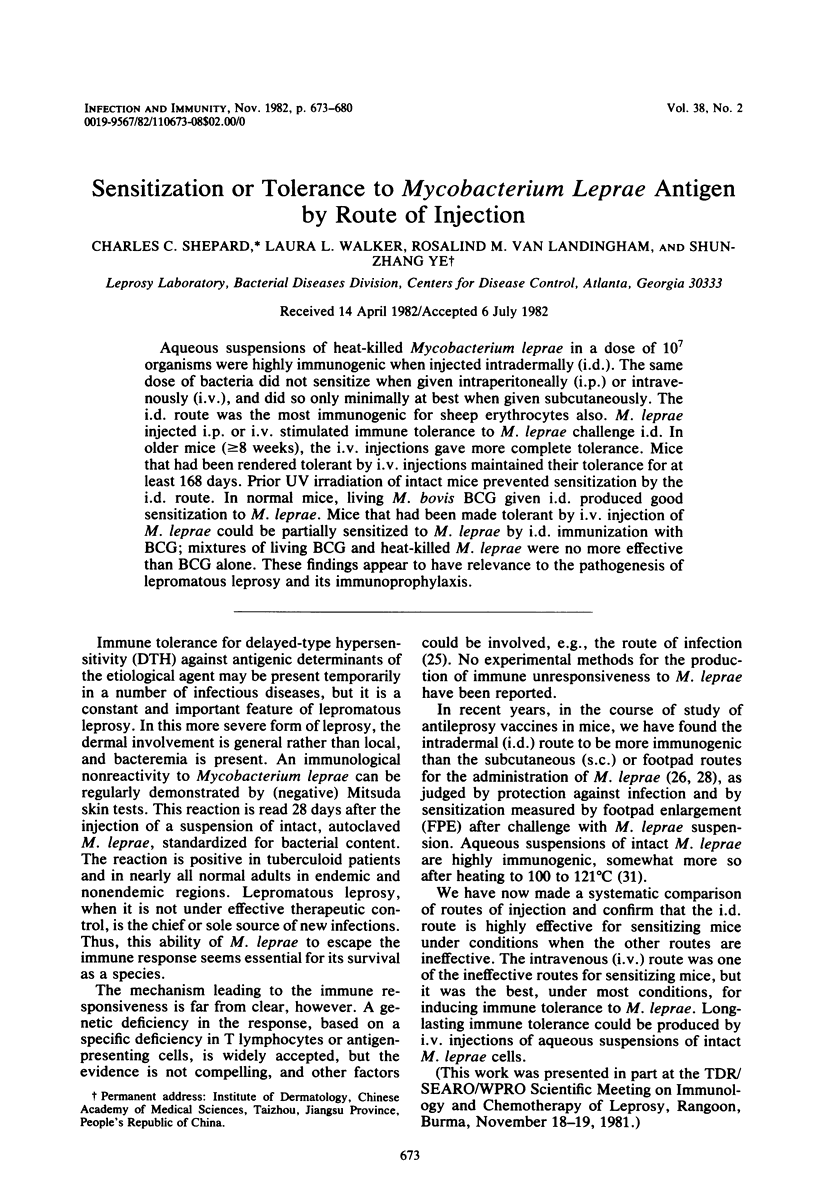
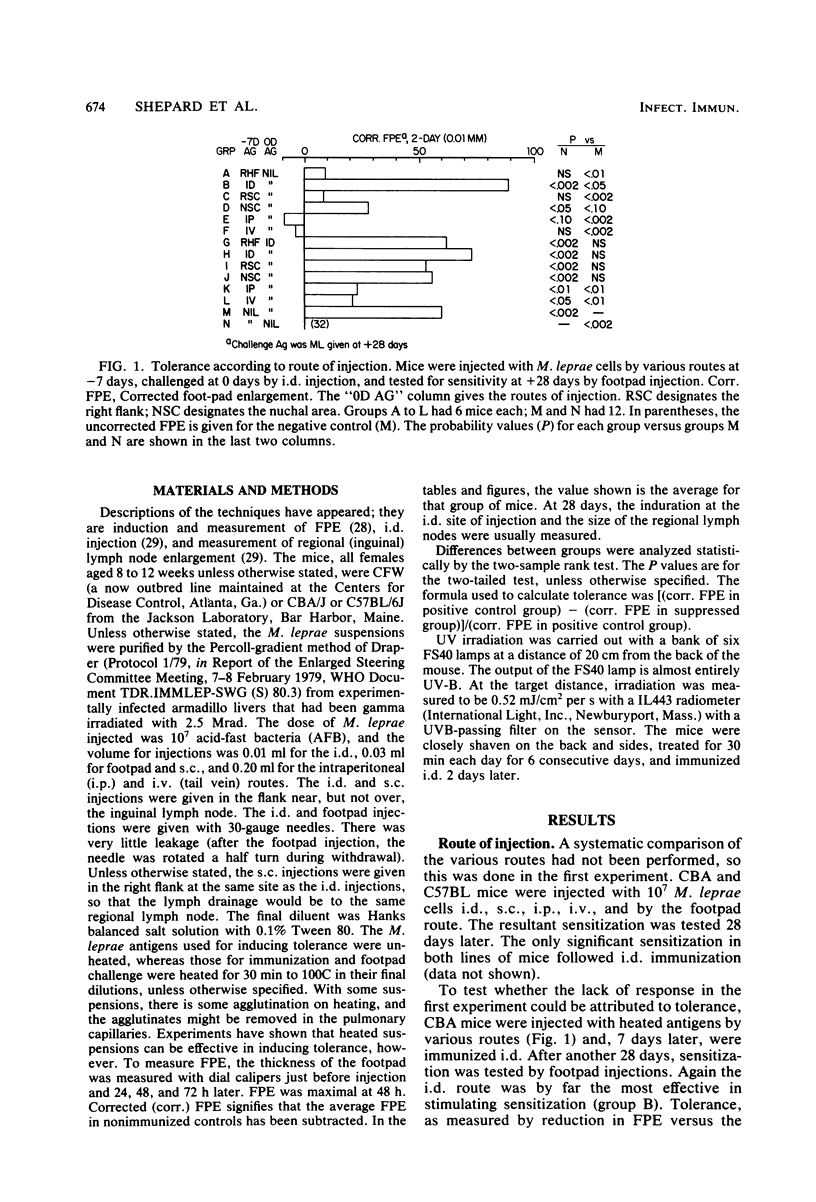
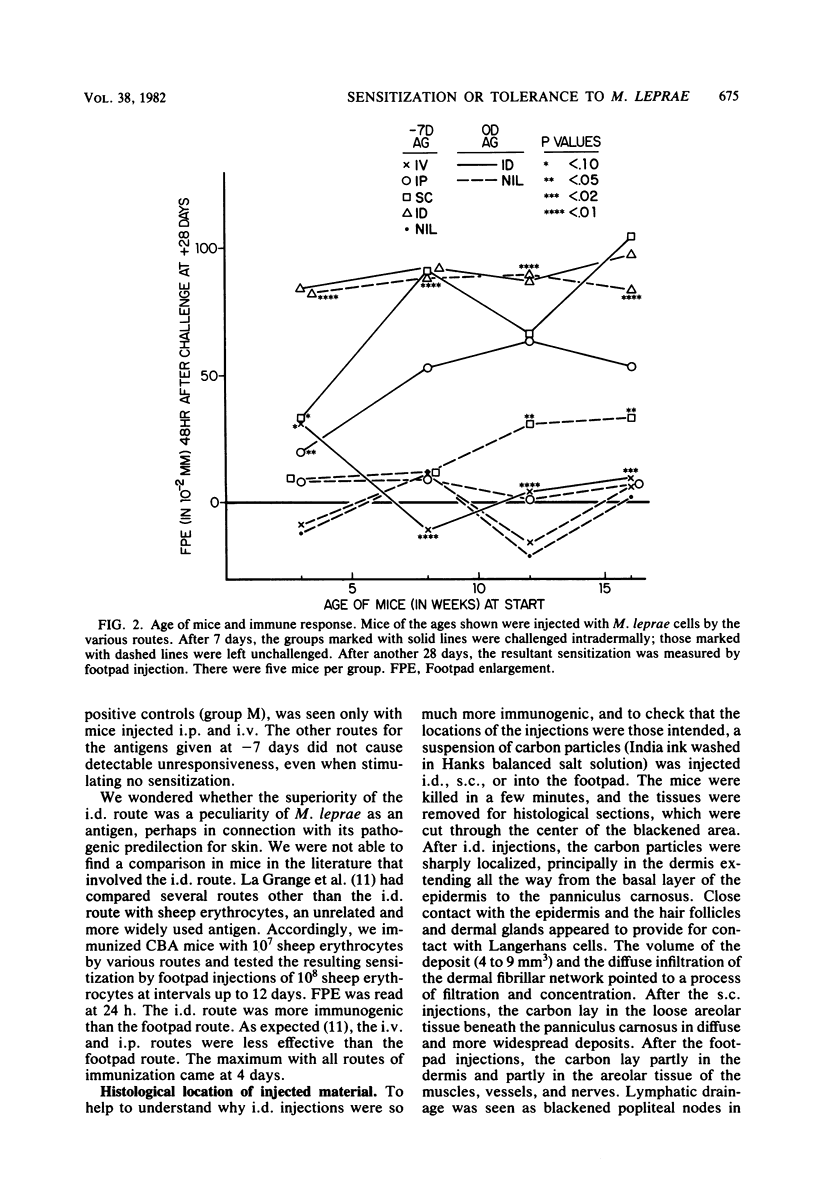
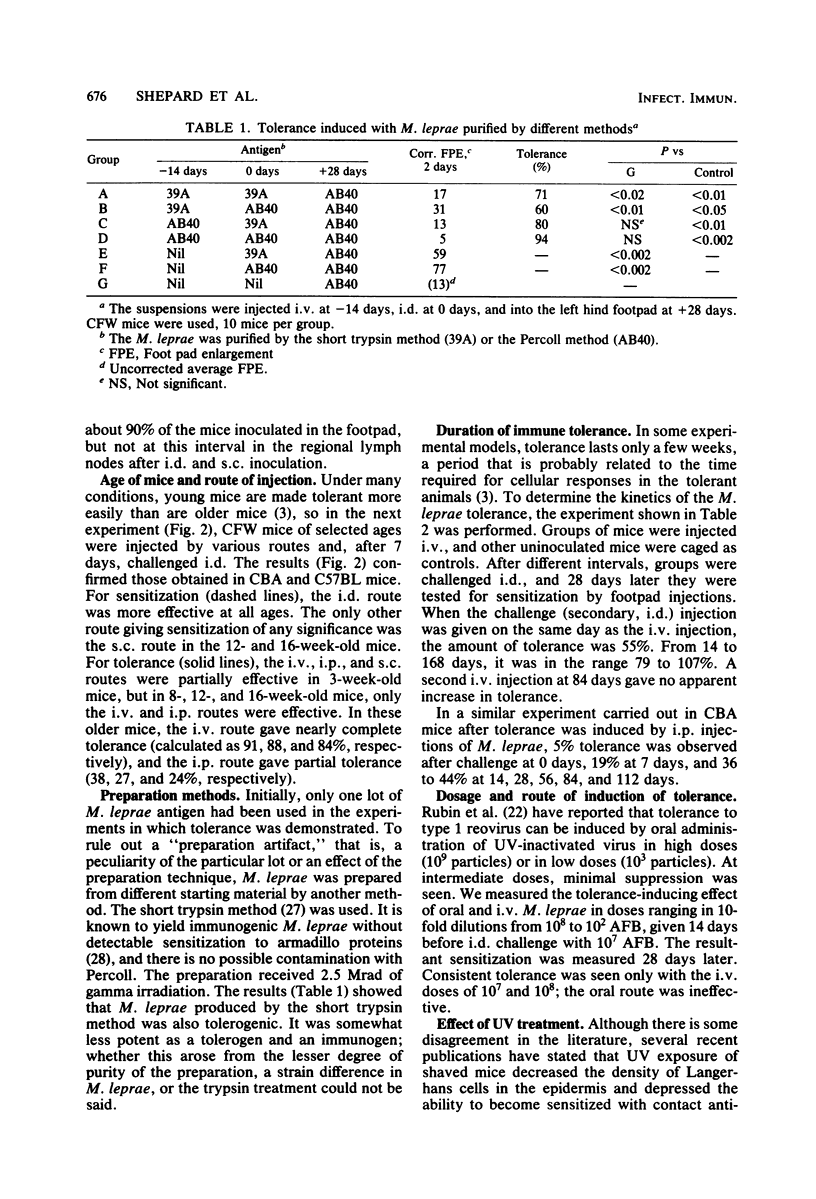
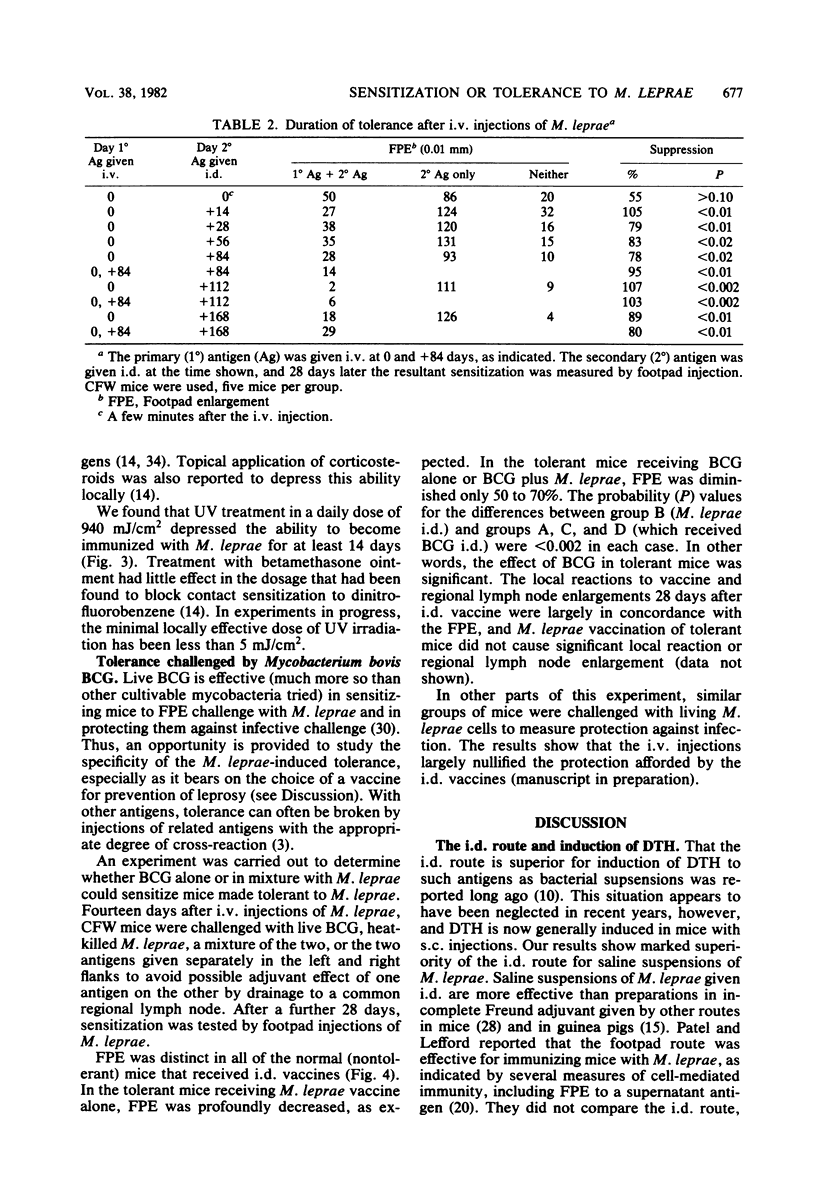
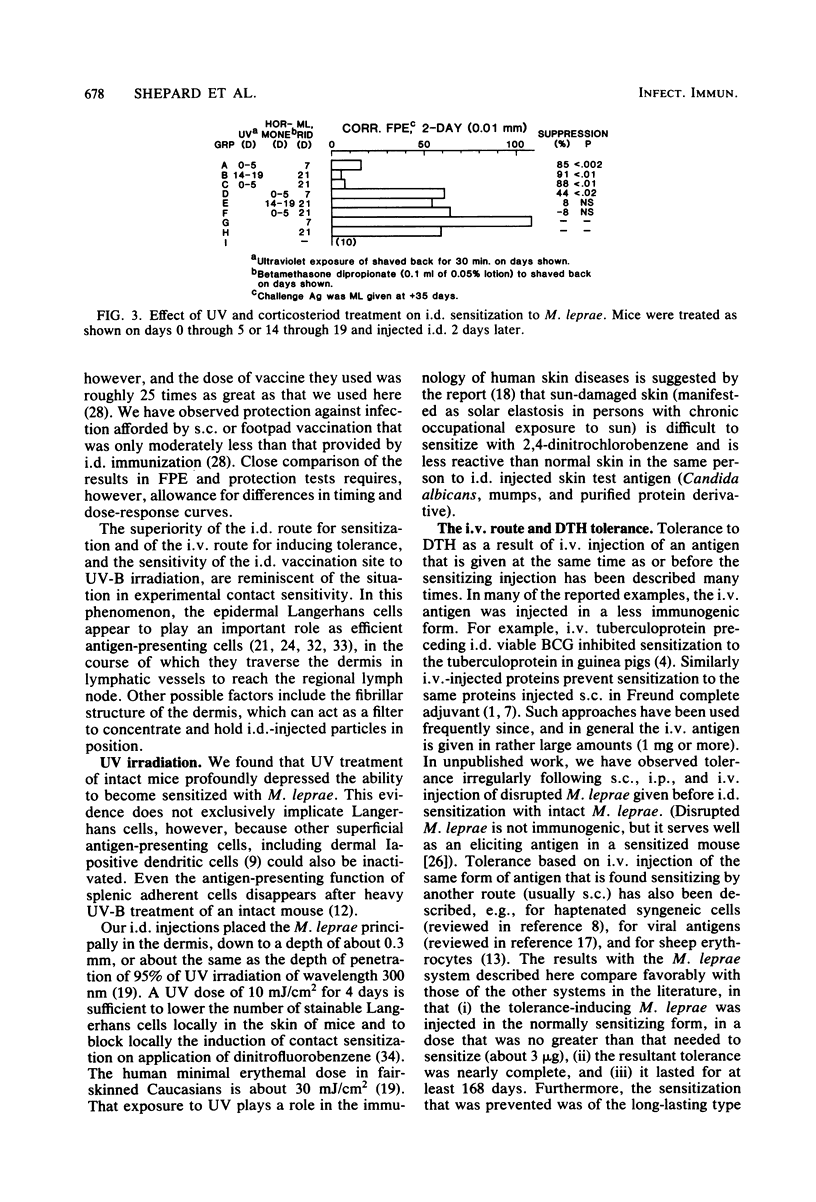
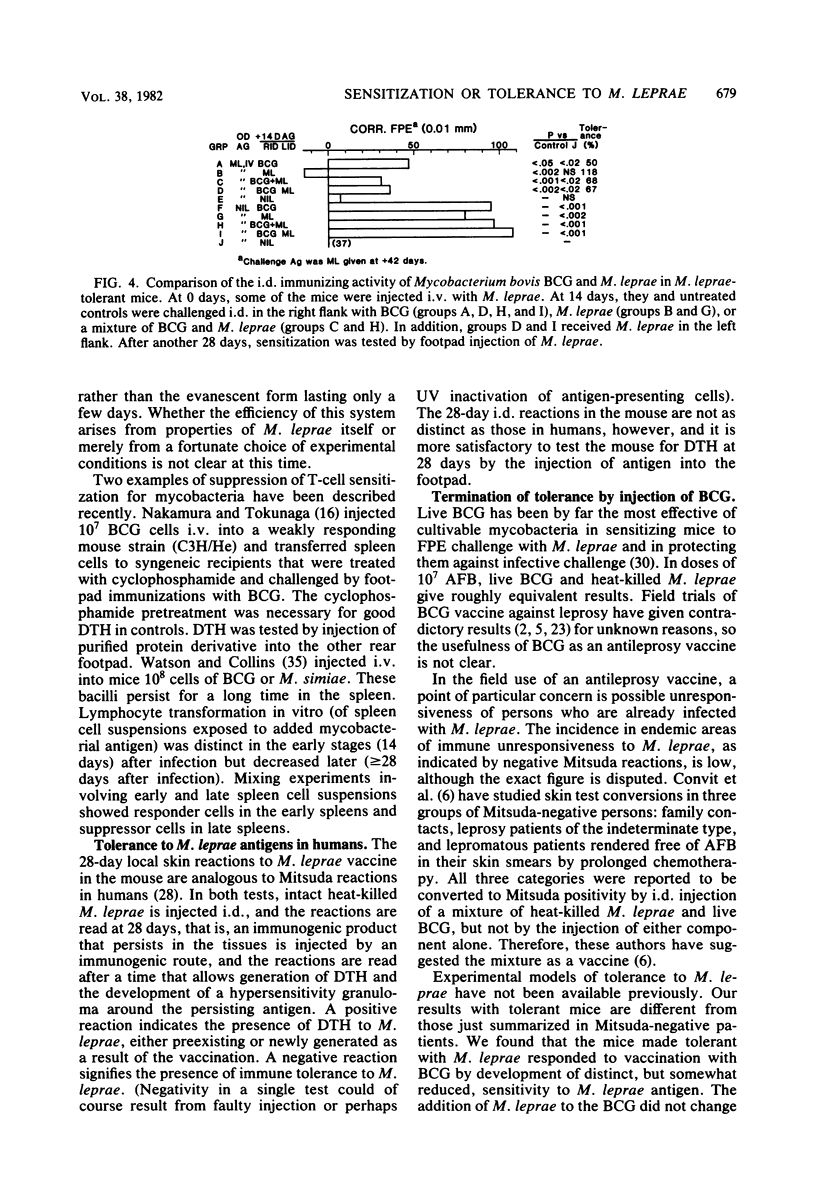
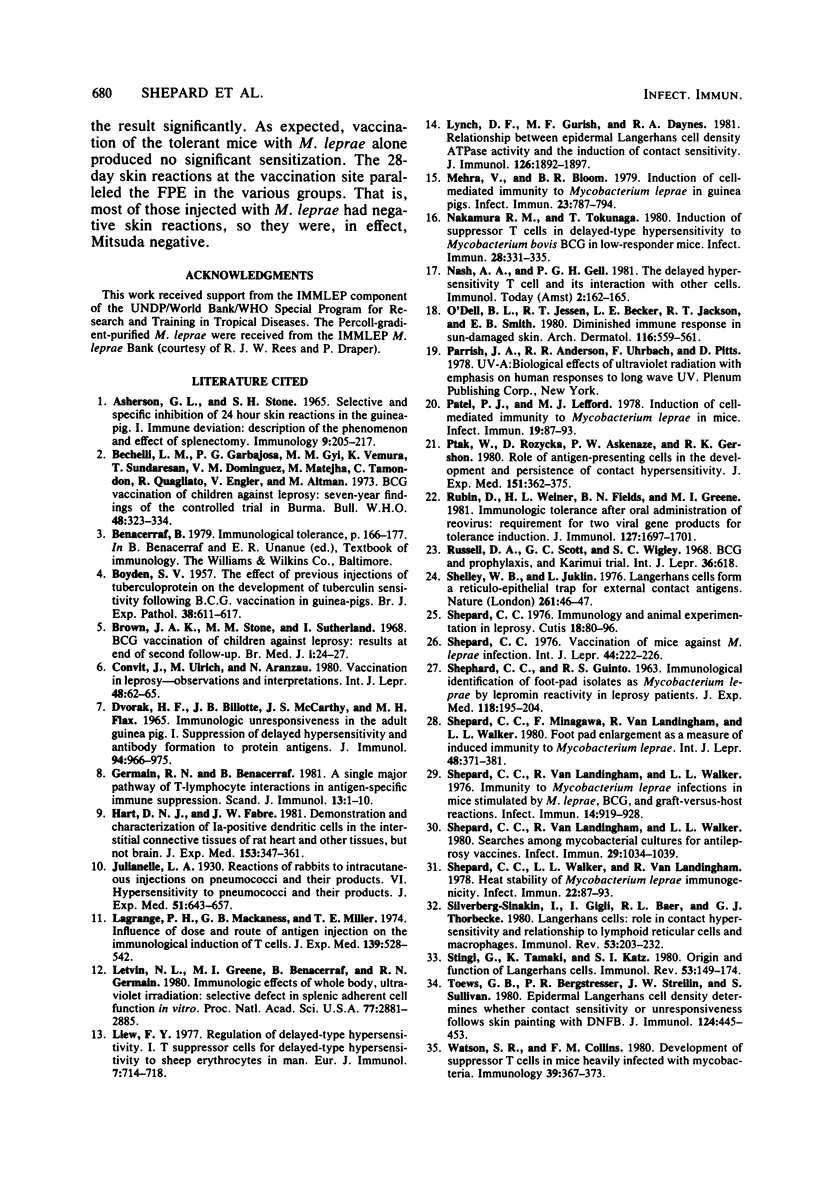
Selected References
These references are in PubMed. This may not be the complete list of references from this article.
- Asherson G. L., Stone S. H. Selective and specific inhibition of 24 hour skin reactions in the guinea-pig. I. Immune deviation: description of the phenomenon and the effect of splenectomy. Immunology. 1965 Sep;9(3):205–217. [PMC free article] [PubMed] [Google Scholar]
- BOYDEN S. V. The effect of previous injections of tuberculoprotein on the development of tuberculin sensitivity following B.C.G. vaccination in guinea-pigs. Br J Exp Pathol. 1957 Dec;38(6):611–617. [PMC free article] [PubMed] [Google Scholar]
- Bechelli L. M., Garbajosa P. G., Gyi M. M., Uemura K., Sundaresan T., Martínez Domínguez V., Matejka M., Tamondong C., Quagliato R., Engler V. BCG vaccination of children against leprosy: seven-year findings of the controlled WHO trial in Burma. Bull World Health Organ. 1973;48(3):323–334. [PMC free article] [PubMed] [Google Scholar]
- Benacerraf B., Germain R. N. A single major pathway of T-lymphocyte interactions in antigen-specific immune suppression. Scand J Immunol. 1981;13(1):1–10. doi: 10.1111/j.1365-3083.1981.tb00104.x. [DOI] [PubMed] [Google Scholar]
- Brown J. A., Stone M. M., Sutherland I. B.C.G. vaccination of children against leprosy in Uganda: results at end of second follow-up. Br Med J. 1968 Jan 6;1(5583):24–27. doi: 10.1136/bmj.1.5583.24. [DOI] [PMC free article] [PubMed] [Google Scholar]
- Convit J., Ulrich M., Aranzazu N. Vaccination in leprosy--observations and interpretations. Int J Lepr Other Mycobact Dis. 1980 Mar;48(1):62–65. [PubMed] [Google Scholar]
- DVORAK H. F., BILLOTE J. B., MCCARTHY J. S., FLAX M. H. IMMUNOLOGIC UNRESPONSIVENESS IN THE ADULT GUINEA PIG. I. SUPPRESSION OF DELAYED HYPERSENSITIVITY AND ANTIBODY FORMATION TO PROTEIN ANTIGENS. J Immunol. 1965 Jun;94:966–975. [PubMed] [Google Scholar]
- Hart D. N., Fabre J. W. Demonstration and characterization of Ia-positive dendritic cells in the interstitial connective tissues of rat heart and other tissues, but not brain. J Exp Med. 1981 Aug 1;154(2):347–361. doi: 10.1084/jem.154.2.347. [DOI] [PMC free article] [PubMed] [Google Scholar]
- Julianelle L. A. REACTIONS OF RABBITS TO INTRACUTANEOUS INJECTIONS OF PNEUMOCOCCI AND THEIR PRODUCTS : VI. HYPERSENSITIVENESS TO PNEUMOCOCCI AND THEIR PRODUCTS. J Exp Med. 1930 Mar 31;51(4):643–657. doi: 10.1084/jem.51.4.643. [DOI] [PMC free article] [PubMed] [Google Scholar]
- Lagrange P. H., Mackaness G. B., Miller T. E. Influence of dose and route of antigen injection on the immunological induction of T cells. J Exp Med. 1974 Mar 1;139(3):528–542. doi: 10.1084/jem.139.3.528. [DOI] [PMC free article] [PubMed] [Google Scholar]
- Letvin N. L., Greene M. I., Benacerraf B., Germain R. N. Immunologic effects of whole-body ultraviolet irradiation: selective defect in splenic adherent cell function in vitro. Proc Natl Acad Sci U S A. 1980 May;77(5):2881–2885. doi: 10.1073/pnas.77.5.2881. [DOI] [PMC free article] [PubMed] [Google Scholar]
- Liew F. Y. Regulation of delayed-type hypersensitivity. I. T suppressor cells for delayed-type hypersensitivity to sheep erythrocytes in mice. Eur J Immunol. 1977 Oct;7(10):714–718. doi: 10.1002/eji.1830071013. [DOI] [PubMed] [Google Scholar]
- Lynch D. H., Gurish M. F., Daynes R. A. Relationship between epidermal Langerhans cell density ATPase activity and the induction of contact hypersensitivity. J Immunol. 1981 May;126(5):1892–1897. [PubMed] [Google Scholar]
- Mehra V., Bloom B. R. Induction of cell-mediated immunity to Mycobacterium leprae in guinea pigs. Infect Immun. 1979 Mar;23(3):787–794. doi: 10.1128/iai.23.3.787-794.1979. [DOI] [PMC free article] [PubMed] [Google Scholar]
- Nakamura R. M., Tokunaga T. Induction of suppressor T cells in delayed-type hypersensitivity to Mycobacterium bovis BCG in low-responder mice. Infect Immun. 1980 May;28(2):331–335. doi: 10.1128/iai.28.2.331-335.1980. [DOI] [PMC free article] [PubMed] [Google Scholar]
- O'Dell B. L., Jessen R. T., Becker L. E., Jackson R. T., Smith E. B. Diminished immune response in sun-damaged skin. Arch Dermatol. 1980 May;116(5):559–561. [PubMed] [Google Scholar]
- Patel P. J., Lefford M. J. Induction of cell-mediated immunity to Mycobacterium leprae in mice. Infect Immun. 1978 Jan;19(1):87–93. doi: 10.1128/iai.19.1.87-93.1978. [DOI] [PMC free article] [PubMed] [Google Scholar]
- Ptak W., Rozycka D., Askenase P. W., Gershon R. K. Role of antigen-presenting cells in the development and persistence of contact hypersensitivity. J Exp Med. 1980 Feb 1;151(2):362–375. doi: 10.1084/jem.151.2.362. [DOI] [PMC free article] [PubMed] [Google Scholar]
- Rubin D., Weiner H. L., Fields B. N., Greene M. I. Immunologic tolerance after oral administration of reovirus: requirement for two viral gene products for tolerance induction. J Immunol. 1981 Oct;127(4):1697–1701. [PubMed] [Google Scholar]
- SHEPARD C. C., GUINTO R. S. IMMUNOLOGICAL IDENTIFICATION OF FOOT-PAD ISOLATES AS MYCOBACTERIUM LEPRAE BY LEPROMIN REACTIVITY IN LEPROSY PATIENTS. J Exp Med. 1963 Aug 1;118:195–204. doi: 10.1084/jem.118.2.195. [DOI] [PMC free article] [PubMed] [Google Scholar]
- Shelley W. B., Juhlin L. Langerhans cells form a reticuloepithelial trap for external contact antigens. Nature. 1976 May 6;261(5555):46–47. doi: 10.1038/261046a0. [DOI] [PubMed] [Google Scholar]
- Shepard C. C. Immunology and animal experimentation in leprosy. Cutis. 1976 Jul;18(1):80–96. [PubMed] [Google Scholar]
- Shepard C. C., Minagawa F., Van Landingham R., Walker L. L. Foot pad enlargement as a measure of induced immunity to Mycobacterium leprae. Int J Lepr Other Mycobact Dis. 1980 Dec;48(4):371–381. [PubMed] [Google Scholar]
- Shepard C. C. Vaccination of mice against M. leprae infection. Int J Lepr Other Mycobact Dis. 1976 Jan-Jun;44(1-2):222–226. [PubMed] [Google Scholar]
- Shepard C. C., Van Landingham R., Walker L. L. Immunity to Mycobacterium leprae infections in mice stimulated by M. leprae, BCG, and graft-versus-host reactions. Infect Immun. 1976 Oct;14(4):919–928. doi: 10.1128/iai.14.4.919-928.1976. [DOI] [PMC free article] [PubMed] [Google Scholar]
- Shepard C. C., Walker L. L., van Landingham R. Heat stability of Mycobacterium leprae immunogenicity. Infect Immun. 1978 Oct;22(1):87–93. doi: 10.1128/iai.22.1.87-93.1978. [DOI] [PMC free article] [PubMed] [Google Scholar]
- Shepard C. C., van Landingham R., Walker L. L. Searches among mycobacterial cultures for antileprosy vaccines. Infect Immun. 1980 Sep;29(3):1034–1039. doi: 10.1128/iai.29.3.1034-1039.1980. [DOI] [PMC free article] [PubMed] [Google Scholar]
- Silberberg-Sinakin I., Gigli I., Baer R. L., Thorbecke G. J. Langerhans cells: role in contact hypersensitivity and relationship to lymphoid dendritic cells and to macrophages. Immunol Rev. 1980;53:203–232. doi: 10.1111/j.1600-065x.1980.tb01045.x. [DOI] [PubMed] [Google Scholar]
- Stingl G., Tamaki K., Katz S. I. Origin and function of epidermal Langerhans cells. Immunol Rev. 1980;53:149–174. doi: 10.1111/j.1600-065x.1980.tb01043.x. [DOI] [PubMed] [Google Scholar]
- Toews G. B., Bergstresser P. R., Streilein J. W. Epidermal Langerhans cell density determines whether contact hypersensitivity or unresponsiveness follows skin painting with DNFB. J Immunol. 1980 Jan;124(1):445–453. [PubMed] [Google Scholar]
- Watson S. R., Collins F. M. Development of suppressor T cells in mice heavily infected with mycobacteria. Immunology. 1980 Mar;39(3):367–373. [PMC free article] [PubMed] [Google Scholar]


